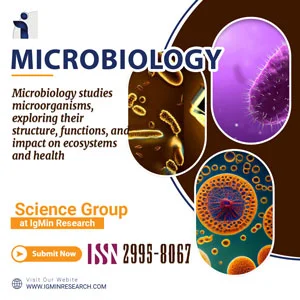Open Access Policy refers to a set of principles and guidelines aimed at providing unrestricted access to scholarly research and literature. It promotes the free availability and unrestricted use of research outputs, enabling researchers, students, and the general public to access, read, download, and distribute scholarly articles without financial or legal barriers. In this response, I will provide you with an overview of the history and latest resolutions related to Open Access Policy.
About
Publish Your Microbiology Research in a Leading Open Access Journal
Are you ready to submit your microbiology research paper to a trusted platform? Discover a seamless publication experience with our open-access microbiology journal, where scientific innovation meets global visibility.
Why Choose Our Journal?
We specialize in publishing cutting-edge research across all fields of microbiology—from microbial genetics and immunology to environmental and industrial microbiology. As one of the fastest-growing microbiology publishing journals, we are committed to accelerating scientific communication by providing rapid, peer-reviewed, and high-quality publications.
Submit Your Microbiology Research Paper with Ease
Our submission process is designed to be straightforward, author-focused, and supportive. Whether you're an early-career researcher or an established scientist, you can submit your microbiology research paper confidently through our user-friendly online system.
Microbiology manuscript submission guidelines are clearly outlined on our website, helping you prepare your work with precision. Our editorial team is available to assist at every step to ensure a smooth submission and peer-review experience.
High-Impact Microbiology Journals Matter
Visibility and credibility matter in science. Publishing in high-impact microbiology journals can significantly enhance the reach and impact of your research. Our journal is indexed in leading databases and follows rigorous peer-review practices to uphold academic integrity and scholarly excellence.
Benefits of Publishing with Us
- Fast & fair peer review
- Global open access – your research is available to readers worldwide
- Inclusion in databases for increased discoverability
- Author-friendly microbiology manuscript submission guidelines
Recognition in the global microbiology publishing journals community
Editors
Biology Group (6)
Open Access Policy refers to a set of principles and guidelines aimed at providing unrestricted access to scholarly research and literature. It promotes the free availability and unrestricted use of research outputs, enabling researchers, students, and the general public to access, read, download, and distribute scholarly articles without financial or legal barriers. In this response, I will provide you with an overview of the history and latest resolutions related to Open Access Policy.
Open Access Policy refers to a set of principles and guidelines aimed at providing unrestricted access to scholarly research and literature. It promotes the free availability and unrestricted use of research outputs, enabling researchers, students, and the general public to access, read, download, and distribute scholarly articles without financial or legal barriers. In this response, I will provide you with an overview of the history and latest resolutions related to Open Access Policy.
Open Access Policy refers to a set of principles and guidelines aimed at providing unrestricted access to scholarly research and literature. It promotes the free availability and unrestricted use of research outputs, enabling researchers, students, and the general public to access, read, download, and distribute scholarly articles without financial or legal barriers. In this response, I will provide you with an overview of the history and latest resolutions related to Open Access Policy.
Open Access Policy refers to a set of principles and guidelines aimed at providing unrestricted access to scholarly research and literature. It promotes the free availability and unrestricted use of research outputs, enabling researchers, students, and the general public to access, read, download, and distribute scholarly articles without financial or legal barriers. In this response, I will provide you with an overview of the history and latest resolutions related to Open Access Policy.
Open Access Policy refers to a set of principles and guidelines aimed at providing unrestricted access to scholarly research and literature. It promotes the free availability and unrestricted use of research outputs, enabling researchers, students, and the general public to access, read, download, and distribute scholarly articles without financial or legal barriers. In this response, I will provide you with an overview of the history and latest resolutions related to Open Access Policy.

Why publish with us?
Global Visibility – Indexed in major databases
Fast Peer Review – Decision within 14–21 days
Open Access – Maximize readership and citation
Multidisciplinary Scope – Biology, Medicine and Engineering
Editorial Board Excellence – Global experts involved
University Library Indexing – Via OCLC
Permanent Archiving – CrossRef DOI
APC – Affordable APCs with discounts
Citation – High Citation Potential
Which articles are now trending?
Research Articles
- Semiclassical Potential Function of B–B Interaction: Reduction to Integrable Form
- Scientific Productivity of the Internet of Things (IoT) in 2011-2025: A Bibliometric Analysis
- Influence of Polycarboxylate Superplasticizer on the Calorimetric and Physicomechanical Properties of Mortar
- Adaptation of the Physical Literacy Scale for Adults into Turkish and Examination of its Psychometric Properties
- Efficacy of Different Concentrations of Insect Growth Regulators (IGRs) on Maize Stem Borer Infestation
- Deep Learning-based Multi-class Three-dimensional (3-D) Object Classification using Phase-only Digital Holographic Information
Advertisement

























